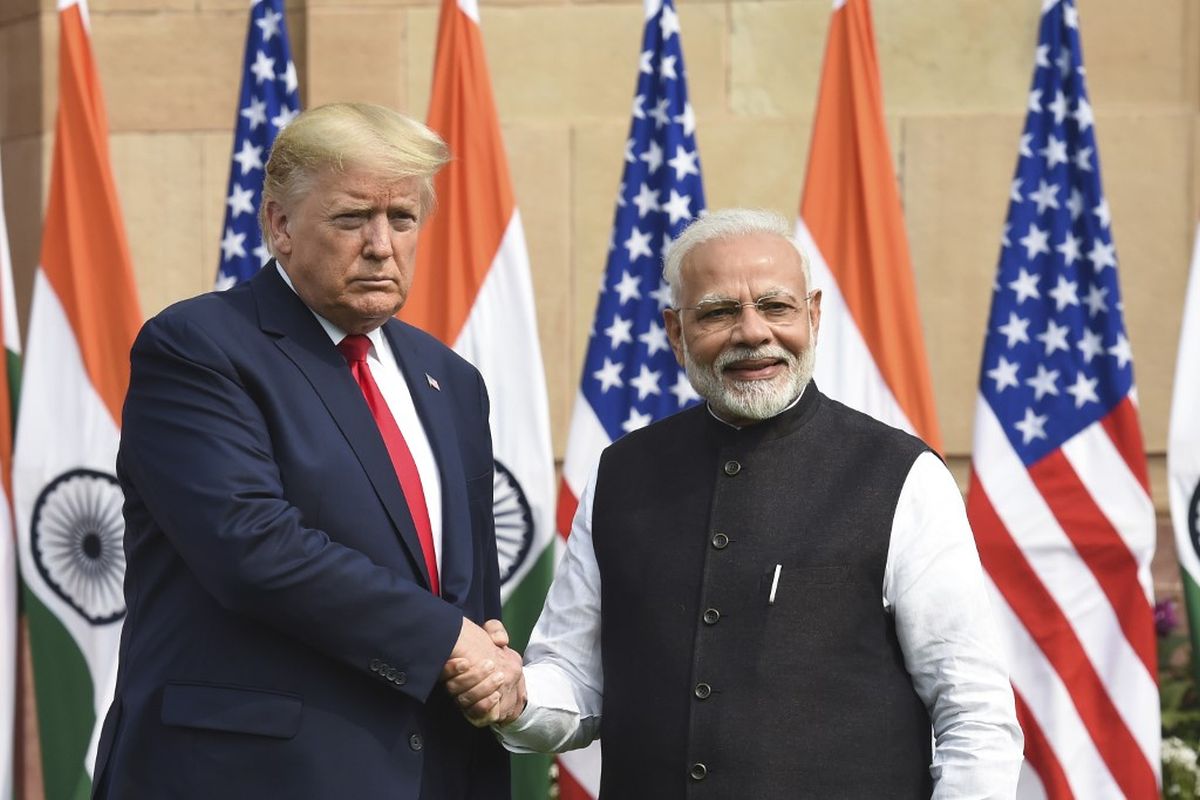Congress committing dacoity on rights of OBCs, SCs, STs: PM
“Wherever it (Congress) can do it, it will try to loot the claims of the SCs, STs and OBCs and give them to others,” said Modi.
US President and Prime Minister Narendra Modi were able to convey a robust message to the west of the Radcliffe Line, thanks largely to their personal chemistry.

India's Prime Minister Narendra Modi (R) shakes hands with US President Donald Trump before a meeting at Hyderabad House in New Delhi. (Photo by Prakash SINGH / AFP)
The diplomatic irony has been rather exceptionally bitter. Donald Trump’s 36-hour visit to India was somewhat pushed out of focus by the communal flare-up that has overwhelmed parts of Delhi, with the death toll rising to 27 till Thursday afternoon.
And yet the US President and Prime Minister Narendra Modi were able to convey a robust message to the west of the Radcliffe Line, thanks largely to their personal chemistry. And unlike some previous US Presidents, Mr Trump chose not to follow up his visit to India with another to Pakistan… as often as not to sing a different piece.
No, he hasn’t played a game of footsie while on his first trip to the subcontinent – in an election year to boot. Unmistakable is the emphatic ring to the joint appeal to Pakistan to ensure that its territory was not used to launch terror attacks on India.
Advertisement
Furthermore, the government in Islamabad, not to forget the GHQ in Rawalpindi, has been asked to “bring to justice” the perpetrators of the Mumbai and Pathankot outrages; the two leaders might as well have added Pulwama to the frightful list of terror strikes. It is quite apparent that both countries have utilised the opportunity to condemn terrorist proxies and cross-border terrorism.
The concerted signal that has been emitted to Pakistan assumes deeper significance when contextualised with last week’s decision of the Financial Action Task Force (FATF) to retain the country on the “grey list” for its failure to suitably address the scourge and “export” of terror. The occasional bouncers of Imran Khan ~ the threat of a nuclear war over the status of Kashmir ~ count for little in the overall construct.
Nor for that matter has the belligerent former cricketer been able to convince the OIC (Organisation of Islamic Cooperation), helmed by Saudi Arabia, to convene a conference on Kashmir and the citizenship issue. Internationally, Pakistan stands in unsplendid isolation. Neither the United States of America nor India had actually expected a trade deal to be concluded. Given the red herrings across the trail, it is rather uncertain whether it can be signed by the end of this year, as Mr Trump imagines.
At any rate, it will be a transitory phase in terms of America’s governance, specifically the presidential election in November and the inaugural in January. Nonetheless, a positive development has been the $2.6 billion defence deal which envisages that India will buy 24 MH-60 helicopters for its Navy.
Additionally, to beef up the strength of the Army, six AH-64 E Apache choppers will be bought at a cost of $ 800 million. The agreements afford a critical impetus to India-US defence ties and are of far greater import than the hugs in Ahmedabad. Having said that, the host country ought to have put its best foot forward. On the contrary, the national Capital was convulsed by communal frenzy over the identity of an Indian… 73 years after Partition.
Advertisement